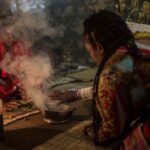Saltad, torkad torsk, så kallad klippfisk (Klipp Fisk) i norra Europa och bacalhau på portugisiska är mer än en konserverad fisk. Den är en resenär, en minnesbärare och en kulinarisk bro mellan kontinenterna. Från Norges torkställningar till Portugals kök och vidare över Atlanten och Indiska oceanen blev klippfisken en stapelvara i de koloniala skafferierna och under generationer en älskad del av det afrikanska köket.
I Lusophone Afrika, särskilt Kap Verde och MoçambiqueBacalhau var inte bara transplanterad, den var förvandlad. Idag lever den vidare som festrätter och vardagsmat som har portugisiskt ursprung men som är omisskännligt afrikansk i smak, konsistens och anda.
Från nödvändighet för sjöfarten till lokalt baslivsmedel
Historien om klippfisken börjar med konservering. Saltning och torkning av torsk gjorde den lätt, hållbar för långa sjöresor och motståndskraftig mot förstörelse i varma klimat. Portugisiska sjömän och nybyggare tog med sig bacalhau till sina kolonier, där den blev en symbol för både praktiska egenskaper och hemkänsla.
Men väl i Afrika mötte bacalhau kassava, matbananer, kokosnöt och peri-peri-chili. Med tiden anpassade de afrikanska kockarna recepten till lokala smaker och säsongens råvaror, och förvandlade en utländsk import till något som smakade som hemma. Det som började som en kolonial nödvändighet rotade sig långsamt i den afrikanska jorden, inte bara i köken utan i identiteten.
Kap Verde: Anpassning till och firande av ön
På öarna i Kap Verde är bacalhau förknippad med festligheter och familjeritualer. Den förekommer på julbord, bröllop och gemensamma sammankomster, där delandet av mat är en handling av gästfrihet och tillhörighet.
Klassiska portugisiska recept som t.ex. bacalhau com natas (torsk bakad i grädde och potatis) och bacalhau à Gomes de Sá (torsk med lök, oliver och ägg) har kapverdiska inslag. Här är vi, Potatis ersätts ofta av kassava, bananer eller mjölbananer.Den ger sötare och jordigare toner som speglar öns råvaror. I andra versioner viks bacalhau in i böngrytor eller krukor med bladgrönsakerdär den fungerar som både protein och smakankare.
För kapverdianer i diasporan är dessa rätter ätbara minnen. En gaffelfull bacalhau com natas i Lissabon eller Boston är mer än nostalgi - det är en förbindelse som håller öarna vid liv över oceanerna.
Moçambique: värme, kokosnöt och kustkänsla
På Moçambiques kust vid Indiska oceanen får bacalhau en ljusare och kryddigare profil. Den populära bacalhau à Brás strimlad torsk som friteras med lök, potatis och ägg är ofta spetsad med peri-peri chilifrukteroch förvandlar maträtten med lokal eld.
Andra moçambikiska versioner lutar sig mot kustens rikedomar: tomatbaserade grytor är berikade med kokosmjölk, palmolja eller tropiska kryddoroch skapar en härlig, djupt färgad sås som fastnar på den saltade fisken. Dessa rätter är vanligtvis reserverade för speciella tillfällen som religiösa fester eller familjemilstolpar. I det dagliga livet är bacalhau fortfarande sällsynt, och den sällsyntheten gör dess utseende symboliskt till ett tecken på överflöd, minne och respekt för traditionen.
Hur klippfisk blir till minne
I både Kap Verde och Moçambique är bacalhau mer än ett recept; det är en berättelse. Varje beredning bär på ekon av migration, kolonisering och återuppfinning. Det som började som en europeisk stapelvara har tagits tillvara, anpassats och förvandlats till en afrikansk tradition.
För kapverdianer är det en smak som följer med diasporan och ger identitet långt hemifrån, för moçambikier är det en påminnelse om skiktade historier och förmågan att smälta samman världar - den portugisiska, den afrikanska, den kustnära och den globala - på en och samma tallrik. I båda fallen är bacalhau ett bevis på att mat aldrig bara handlar om näring. Det är ett minne du kan äta.
Samtida förnyelse och parningar
I dag fortsätter klippfisken att utvecklas i afrikanska kök och i andra länder.
- Kap Verdeanska kockar utomlands Byt ut grönkål eller grönkål mot ögrönsaker eller tillaga bacalhau med lokalt tillgängliga rotfrukter.
- Moçambikiska kockar experimentera med kokosnötsrika bacalhau-grytor eller peri-peri-smaksatta torskfritters och blanda tradition med innovation.
- Kök för finare matlagning i Europa och Afrika omtolkar bacalhau som kroketter, tapas eller tallriksrätter som knyter an till dess enkla rötter.
Kombinationerna är lika mångsidiga: en krispig portugisisk Vinho Verde kompletterar krämig bacalhau com natas, medan palmvin, cashewsprit eller lokala ölsorter föra tillbaka rätterna till afrikanska sammanhang.
Recept: Bacalhau à Brás på moçambikiskt vis med Peri-Peri
Det här receptet tar den portugisiska klassikern och ger den moçambikisk hetta och känsla. Perfekt för en festlig måltid eller en djärv middag mitt i veckan.
Servering: 4 Ingredienser
- 400 g saltad torsk (klippfisk/bacalhau), blötlagd över natten för att avlägsna överflödigt salt
- 3 medelstora potatisar, skalade och skurna i tunna tändstickor
- 1 stor lök, tunt skivad
- 2 vitlöksklyftor, finhackad
- 2 färska peri-peri-chilifrukter (eller 1 tsk peri-peri-sås)
- 3 msk olivolja (eller ersätt med lokal olja som solros- eller palmolja för en djupare smak)
- 4 ägg, lätt uppvispade
- Handfull hackad färsk persilja
- Svarta oliver, för garnering
- Salt och svartpeppar, efter smak
Metod
- Förbered torsken: Låt den blötlagda torsken rinna av och sjud den sedan i färskt vatten i 10 minuter tills den är mjuk. Låt rinna av, svalna något och strimla i flingor, ta bort ben och skinn.
- Koka potatisen: Hetta upp olja i en stor stekpanna och stek sedan potatisstavarna tills de är gyllene och krispiga. Ta upp och lägg åt sidan.
- Bygg upp basen: Tillsätt lök, vitlök och peri-peri-chili i samma panna. Fräs tills de är mjuka och doftar gott.
- För samman det: Lägg den strimlade torsken och den friterade potatisen i pannan och vänd runt ordentligt. Häll i de vispade äggen och rör om försiktigt tills äggen precis har stelnat men fortfarande är krämiga.
- Avsluta: Krydda med salt och peppar, strö över persilja och garnera med svarta oliver.
Servera varm, med en fräsch sallad eller chapati vid sidan om.
Slutlig reflektion
Klippfisk i det lusofona Afrika är en berättelse om motståndskraft och återuppfinning. Konserverad fisk som en gång var avsedd för sjömäns överlevnad har blivit ett medel för identitet, kultur och firande.- I Kap VerdeDet är krämiga grytor och grytor med kassavarötter som delas runt bord som är fulla av familj och festligheter.
- I Moçambiqueär det chilirika wokrätter och kokosnötssmakande grytor som äts när det är som viktigast.
På båda platserna är bacalhau mer än fisk. Det är historia - saltad, transporterad över haven och sjudande till tillhörighet. Det är ett utsökt bevis på att när kulturer möts så kolliderar de inte bara. De skapar.
Relaterade inlägg
-
Ekoturism i Afrika: Safaris, naturvård och samhällspåverkan
Upptäck hur ekoturism i Afrika förvandlar resor till en kraft för gott - skydda vilda djur, stärka samhällen,...
-
Wainga, helaren: Häxkonst, visdom och motstånd i det koloniala Kenya
Utforska berättelsen om Wainga, en helare från Nyeri som anklagades för att “syssla med Satan” under Kenyas...
-
Kloka djur och listiga varelser: Djurmyter och legender i afrikansk folklore
I skenet från brasan berättades historier inte bara för att underhålla, utan också för att...


